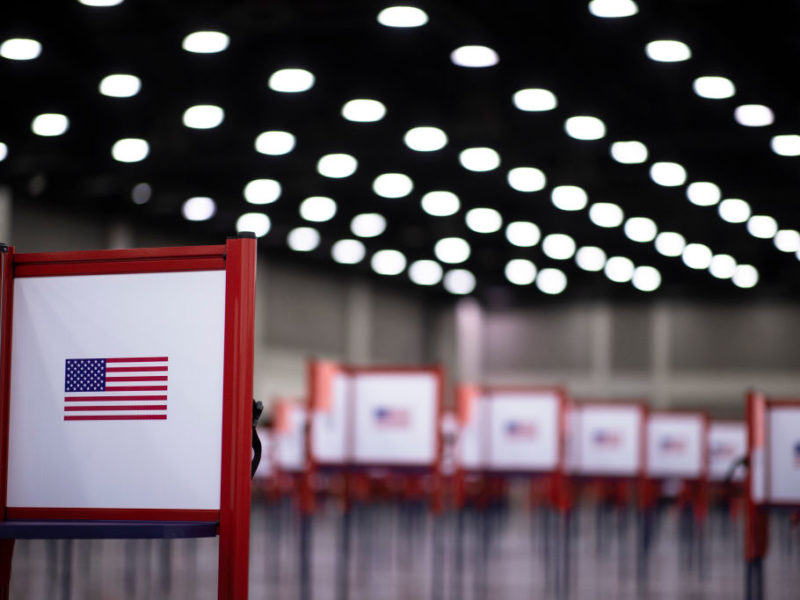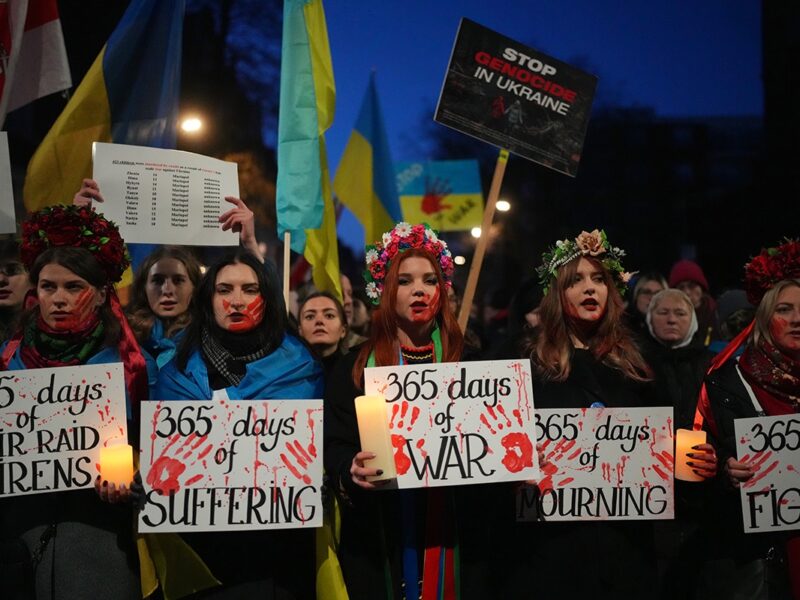How Will We Remember Jimmy Carter?
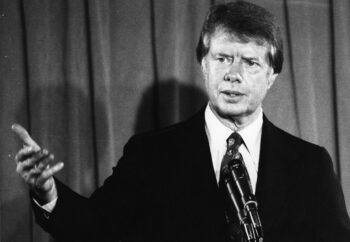
With former President Jimmy Carter entering hospice care at his home in Georgia last month, experts and historians are reflecting on how the 39th president will be remembered.
Terry Anderson, a professor history at Texas A&M University, has a bold assessment: “I believe that Jimmy Carter is the most underrated president in modern American history.”
Carter, 98, served just one term from 1977-1981 before losing his bid for re-election to former Gov. Ronald Reagan of California in 1980. Anderson said public opinion had soured on Carter in the last half of his administration after a series of events that were both in and out of his control – the Soviet Union’s invasion of Afghanistan, a 444-day hostage crisis in Iran in which American diplomats were held captive, and surging inflation, to name a few.
“He had two and a half, three good years, and then he had the worst last year possible,” Anderson said. “And a lot of it has nothing to do with him. But we often think of him looking back on the last part, not the first part, of his administration.”
Despite his missteps, Carter’s presidency was more consequential than most recall, Anderson said.
To start, he said Carter changed the direction of U.S. foreign policy by making human rights a centerpiece. He negotiated the Camp David peace accords between Egypt and Israel, normalized diplomatic and trade relations with China, and signed the Panama Canal Treaty. Anderson pointed out that Carter established the Department of Energy and Department of Education, and he also deregulated the airline industry.
What Carter did after the presidency will also be a large part of his legacy, Anderson said.
“He started the Carter Center and has been involved in more than 100 negotiations on elections or observing elections, and because of this there has been a huge American presence in the world,” Anderson said. “Because of this, he won the 2002 Nobel Peace Prize. No one has done as much in their post-presidential years.”
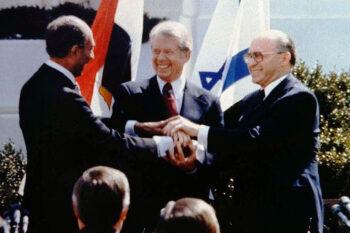
‘The Right Person For The Moment’
Little was known about Carter nationally before he used the 1976 Iowa caucuses to propel his campaign for the Democratic nomination and put himself on the road to the White House, said Kirby Goidel, a professor in the Department of Political Science.
Goidel said Carter helped reshape the electoral landscape, and made Iowa an essential destination for presidential candidates. As a candidate, Carter also “perfectly reflected the moment.”
“In the wake of the Vietnam War and Watergate, Americans had largely lost faith in their government,” Goidel said. “Honest, humble and from a small town in Georgia, Carter was the right person for the moment.”
Carter’s presidency is largely remembered for its failures – Goidel said he was largely unsuccessful due to his lack of understanding of Washington politics. As president, he said Carter didn’t have the media savvy of Reagan, for example, or the charisma of Bill Clinton.
“Years after, ‘He would be another Jimmy Carter’ was an insult Democratic candidates ran away from,” Goidel said. “But he was a fundamentally good and decent person. It is no exaggeration to say that no American president has used their post-presidency more effectively to continue to do good work and reshape our world.”
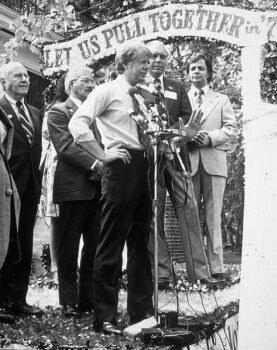
Goidel draws a parallel to President George H.W. Bush — both former presidents were “honest people who put country first.” While neither were re-elected to a second term, they set the stage for their successors by making difficult and oftentimes unpopular decisions.
“Carter served his country during a very difficult time, helped to move it past the Vietnam War and Watergate, began the work of economic recovery not fully felt until 1983 during the Reagan Administration, and continued after his presidency to faithfully serve his community and country,” Goidel said. “Given our current politics, it seems unlikely that we will see another Jimmy Carter, and our country is the worse for it.”
Middle East Policy
Carter’s policies in the Middle East were responsible for both his most enduring success in foreign policy, and at the same time, his most notorious failure, said F. Gregory Gause, professor at the Bush School of Government and Public Service’s Department of International Affairs.
The historic peace agreements between Egypt and Israel that Carter mediated in 1978 at Camp David transformed the Arab-Israeli conflict, Gause said. Though unresolved issues in the region abound, and the Camp David Accords didn’t immediately end the hostilities, Gause said Carter’s efforts endure in that Egypt and Israel are still at peace. Carter would later go on to be awarded the Nobel Peace Prize, in part for his efforts to find peaceful solutions to international conflicts.
But the Iranian hostage crisis that consumed the last year of Carter’s presidency did “enormous” political damage to his legacy, Gause said.
“It made the United States look like a weak state in confronting this revolutionary upheaval in Iran,” Gause said. “There was enormous public discontent over his handling of the hostage crisis.”
On Nov. 14, 1979, a group of Iranian students who supported the Iranian Revolution seized the U.S. embassy in Tehran, holding dozens of Americans captive for 444 days. Gause said the ordeal cemented a public perception of Carter being “ineffectual.”
“There were daily reports on all the television networks about what was called ‘America Held Hostage,’ and there was a perception that Carter was unable to do anything about it,” Gause said. “He did try to mount a military operation to rescue the hostages, and it had to be aborted before it got close to Tehran. So even the one military action that Carter took to try to get the hostages out was a failure.”
Despite this, Gause said, Carter will likely be remembered by the public as a model example for former presidents, having lived a modest life after leaving the White House and “doing good” wherever he could.
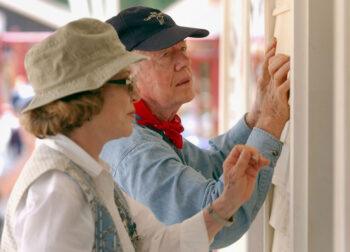
Post-Presidency Philanthropy
Carter’s more than 35 years of support for Habitat for Humanity are “so legendary,” said Instructional Assistant Professor Angela Seaworth, that Habitat staff report many people mistakenly believe he founded the global nonprofit housing organization.
Seaworth, who teaches at the Bush School and serves as director of Philanthropic Initiatives and Capacity Building at the Center for Nonprofits & Philanthropy, said the numerous photographs of Carter and former first lady Rosalynn Carter doing volunteer construction work are enduring images for many Americans. However, she said, this is only a small part of their philanthropic contributions.
“Many people associate President and Mrs. Carter from those images, but the philanthropic impact he has had related to promoting peace, alleviating suffering and improving health is far-reaching,” Seaworth said.
The couple’s civic involvement has focused on serving the public good – from global initiatives at the Carter Center to their local community, Seaworth said. Carter famously taught Sunday school every week into his nineties, and he has been quoted about choosing to value dignity in service. In his Nobel acceptance speech, Carter said, “We can choose to alleviate suffering. We can choose to work together for peace.” Seaworth calls this choice to serve the “purest form of altruism, defined as voluntary action for the public good.”
The Carter Center, founded by the former president and first lady in 1982, works to advance human rights, alleviate human suffering, prevent and resolve conflicts, enhance freedom and democracy and improve health. Seaworth said the Carters’ philanthropic efforts through the center have been strategic, and proven that collaboration between international agencies, health organizations, nonprofits and government can lead to progress in resolving social issues.
For example, the Carter Center has worked to eliminate six preventable diseases: Guinea worm, river blindness, trachoma, schistosomiasis, lymphatic filariasis and malaria in Hispaniola. Thanks to Carter’s efforts, guinea worm disease – a parasitic infection contracted when people drink water contaminated with Guinea worm larvae – could soon be eradicated.
“President Carter once commented that he hoped to outlive the Guinea worm, and according to the case count, last year there were only 13 cases reported in the world,” Seaworth said.
According to the Carter Center, it could be the second human disease in history, after smallpox, to be eradicated.
“President Carter has very quietly gone about the work of cultivating dignity in service,” she said. “It seems a fitting way for the public to remember him is that he demonstrated that we all can play a role in helping others in our own neighborhoods and around the world. He showed us how to serve.”
Media contact: Caitlin Clark, caitlinclark@tamu.edu
